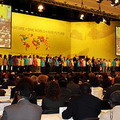聯合國專家:糧荒危機 其實是生態惡化的具體反映
 聯合國19日於德國波昂召開史上最盛大的生物多樣性會議,德國環境部長加布里爾(Sigmar Gabriel)在開幕致辭中呼籲全球政府採取更強硬的行動來保護生物多樣性。加布里爾警告,全世界並未朝保護物種多樣性的方向努力,我們將無法達到當初大家所同意的,於2010年逆轉生物多樣性喪失的目標。
聯合國19日於德國波昂召開史上最盛大的生物多樣性會議,德國環境部長加布里爾(Sigmar Gabriel)在開幕致辭中呼籲全球政府採取更強硬的行動來保護生物多樣性。加布里爾警告,全世界並未朝保護物種多樣性的方向努力,我們將無法達到當初大家所同意的,於2010年逆轉生物多樣性喪失的目標。
這次「聯合國生物多樣性大會」共有來自191個國家近7000人參加,預計於5月30日閉幕,就全球生物多樣性保育與永續管理作為達成決議,以回應聯合國官員所揭示的警訊:「物種消失因全球暖化的壓力而加劇,其消失的速度更令人擔憂。」
生物多樣性課題一:確保利潤公平分享
加布里爾呼籲大會擬出清楚的前進方向,類似2007年12月在巴里島達成的「峇里島路線圖」,以建立一系列生物多樣性的國際準則,用來管理生物資源的取得方式和其相關利益的公平分配。這些準則將針對所有生物多樣性資源的使用者,包括製藥公司,規範他們的取得方式。
加布里爾表示,除了規範資源取得方式,「相對的也將針對資源提供者設立規範,確保他們能獲得公平的利潤。這些資源提供者包括在地社區,或國家政府,他們有許多都位於發展中國家。」
這次大會也正好遇上5月22日的國際生物多樣性日。在全球糧食價格飆漲的此時,今年聯合國將主題定為「生物多樣性與農業」。
因此,生物多樣性公約秘書處希望與會國能夠強調永續農業,不僅僅是保育生物多樣性,更要確保我們能夠餵飽全世界、維持農村生計,並且在21世紀能夠強化人類福祇。
這次大會將在下週召開一次「波昂生物多樣性高峰會」,做出大會結論,該會將由德國總理梅克爾主持,預計會有120名來自各國代表與部長參加。
在波昂會議中浮現的另一個期限是:創造一個公平分享系統,這是各方政府在兩年前於巴西達成的協議。他們打算設計一個系統,提供發展中國家和已發展國家之間能公平分享世界基因資源利益的管道。
生物多樣性課題二:糧價攀升反映生態危機
 生物多樣性公約執行秘書朱格拉夫(Ahmed Djoghlaf)表示,波昂生物多樣性會議的舉辦,正好處於歷史上的決定性時刻。
生物多樣性公約執行秘書朱格拉夫(Ahmed Djoghlaf)表示,波昂生物多樣性會議的舉辦,正好處於歷史上的決定性時刻。
朱格拉夫在19日的開幕演講中表示:「每個物種都是維繫我們星球生命網絡的複雜謎團裡的重要部份。物種間的交互連結將這個謎團緊緊黏牢,使我們的星球能運作。」
「世界賴以維生的穀類作物,大約2/3要仰賴昆蟲或其他動物傳播花粉,以結出健康的果實和種子,包括馬鈴薯在內。」朱格拉夫接著說:「在德國,蜜蜂數量已減少了25%,而美國東部的蜂群則減少70%。如果授粉者消失,地球上有許多物種也會跟著滅絕。一旦我們拿走某個連結,整條鏈就會被破壞掉。」
朱格拉夫引述偉大物理學家愛因斯坦的名言:「如果蜜蜂從地球表面消失,那麼人類將只剩4年可活。沒有蜜蜂,就沒有授粉;沒有授粉,就沒有植物、動物和人類。」
「開始蔓延的全球糧食危機,聽起來像是要喚醒人類行為對地球生命永續所造成的嚴重後果。糧價急遽攀升是農作物喪失生物多樣性的徵狀,這是空前未有的,而這也著實反映出它對人類的深遠影響。這個挑戰令人退懼,所以我呼籲所有國家都要特別努力。」朱格拉夫如此表示。
依照朱格拉夫於演說中引自發展經濟學家蘇克德夫(Pavan Sukhdev)最新研究的數據,喪失生物多樣性所提供的效益,每年將耗損世界3.1兆美元,或是全球6%的國民生產毛額。
German Environment Minister Sigmar Gabriel Monday urged governments to take stronger action to protect the diversity of life. Opening the largest UN biodiversity gathering yet, Gabriel warned that the world is not on the right path to protect the diversity of species and said the world would not reach its agreed target of the year 2010 for reversing biodiversity loss.
Nearly 7,000 participants from 191 countries opened the United Nations Conference on Biodiversity in Bonn on Monday. Before the meeting closes on May 30, participants are expected to take steps to conserve and sustainably manage the world's biodiversity in light of what UN officials are calling "the alarming rate of loss of species, compounded by the pressures from climate change."
Gabriel called for a clear roadmap, similar to the one on climate reached in Bali last December, toward a plan to establish an international set of rules for biodiversity that would govern the providing of access and equitable sharing of the benefits.
Rules would set the terms under which users of biodiversity resources, such as pharmaceutical companies, would have access to resources.
These terms would be balanced with provisions to guarantee that the providers of these resources, such as local communities or national governments, many of which are in developing countries, receive an equitable share of any of the benefits that are produced, said the minister.
The conference is timed to coincide with the International Day for Biological Diversity on May 22.
As food prices spiral ever upwards, this year's theme for the day is "Biodiversity and Agriculture."
The Secretariat of the Convention on Biological Diversity wants the Parties to highlight sustainable agriculture "not only to preserve biodiversity, but also to ensure that we will be able to feed the world, maintain agricultural livelihoods, and enhance human well being into the 21st century and beyond."
The gathering will submit its results next week to the Bonn Biodiversity Summit, which will be chaired by German Chancellor Angela Merkel. The attendance of 120 heads of states and ministers is expected.
Another deadline looming over this Bonn conference to create a fair-share system was agreed by the government Parties to the treaty two years ago in Brazil.
They intend to devise a system that provides access to, and shares the benefits from the genetic resources of the world fairly between developing and developed countries.
The Bonn Biodiversity meeting is taking place at a defining moment in the history, said Ahmed Djoghlaf, executive secretary to the Convention on Biological Diversity.
"Every species is a vital piece in the complex puzzle of the life web of our planet. Interlinkages are what keep the puzzle glued together—for the planet to function," Djoghlaf told the participants in his opening address to the conference on Monday.
"About two thirds of the food crops that feed the world rely on pollination by insects or other animals to produce healthy fruits and seeds. Included among these are potato crops," Djoghlaf said.
"Here in Germany, there has been a 25 percent drop in bee populations across the country," he said. "In the eastern United States, bee stocks have declined by 70 percent. If pollinators disappear, so too will many species of plants. If we take away one link, the chain is broken."
Djoghlaf quoted the great physicist Albert Einstein as saying, "'If the bee disappeared off the surface of the globe, then man would only have four years of life left. No more bees, no more pollination, no more plants, no more animals, no more man.'"
"The unfolding global food crisis sounds like a wake-up call to the serious consequences of human activities on the ability of our planet to continue sustaining life on Earth," Djoghlaf said. "The dramatic rise in crop prices is a symptom of the unprecedented loss of agricultural biodiversity and certainly a reflection of its far-reaching impacts on humankind."
"The challenge is daunting and I call upon all states to adopt exceptional efforts," he said.
Losing the benefits that biodiversity provides would cost the world $3.1 trillion a year or six percent of the global gross national product, according to a new study by development economist Pavan Sukhdev, cited by Djoghlaf during his speech.
全文及圖片詳見:ENS

